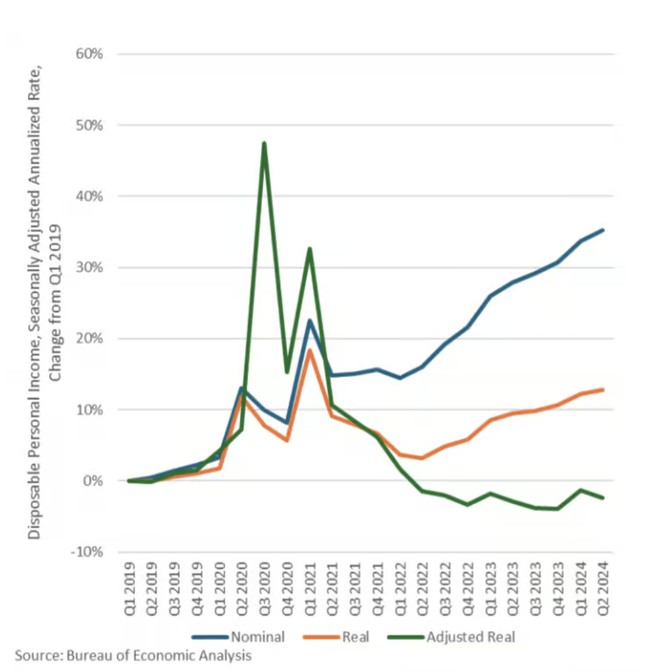
There has obviously been a lot of juking the economic numbers to make the economy look better than it is, but this report from the Brownstone Institute explains that systemic flaws in how economic statistics are generated account for some of the disparity between the statistics and our observations.
Advertisement
This study corrects bad inflation data and merges that with output -- to show that we've been in recession 2.5 years already! It furthers reveals the devastation of the Covid response. https://t.co/i0MUCCq6hq via @brownstoneinst pic.twitter.com/koqaqWCPUp
— Jeffrey A Tucker (@jeffreyatucker) October 9, 2024
As I have said several times, the relatively new Brownstone Institute has become indispensable. You should follow them and Jeffrey Tucker on Twitter/X to get a steady stream of important reads.
So, what's wrong with the statistics other than political manipulation? Let them count the ways by too extensively quoting from their piece:
Adjustments
The difficulty in measuring the size of a nation’s economy is two-fold.3 First, there is insufficient data to directly measure the number and size of all transactions in an economy, or to monitor all economic activity. Second, the measuring tool used (in this case, the Federal Reserve note) changes value over time. Thus, fluctuations in the nominal value of economic activity can be due to real changes in economic activity, measurement error of economic activity, or changes in the value of a currency.
The government metrics for inflation suffer from various problems which tend to underestimate the rise in prices over time. These shortcomings have been more pronounced over the last four years during a relatively rapid depreciation of the currency. This study does not attempt to address difficulties concerning measuring the nominal value of economic activity but instead offers an alternative adjustment for converting nominal growth to real growth by more accurately reflecting changes in the cost of living over time.
Bias Related to Housing
One of the most cited inflation gauges is the consumer price index (CPI). It measures the change in price for a fixed basket of goods and services over time. While the index contains a proxy for the cost of homeownership, it does not actually account for this directly. Instead, the CPI imputes this value from rents, without observing home prices or interest rates.4 Called “owners’ equivalent rent of residences,” this category has a relative importance of over 26 percent, meaning it makes up more than a quarter of the CPI.
If the costs to rent and own change commensurately over time, then this methodology will be relatively accurate. Unfortunately, the cost of owning a home has risen much faster than rents over the last four years and the CPI has grossly underestimated housing cost inflation. The cost of housing services in the National Economic Accounts published by the Bureau of Economic Analysis suffers from similar methodological problems.
Bias Related to Regulation
There are also issues with quantifying the effects of certain government regulations, which can affect hedonic adjustments that typically adjust prices downwards when government statisticians believe a product has improved.5
The difficulty of estimating such improvements can result in artificial cost reductions due to perceived benefits to the consumer that do not actually exist. For example, if it is assumed that a regulation increases the quality of a product, then even a dramatic increase in price could register as no price change or even a price decline in the national accounting which is used to compute gross domestic product (GDP).6
Bias Related to Indirect Purchases
Further challenges exist to measuring inflation and price changes when consumers are not directly charged for services, like health insurance.7 Premiums are used both to pay for the actual cost of providing the service of insurance (risk mitigation) and for medical services and commodities. The CPI neglects both, and instead imputes the cost of health insurance from the profits of health insurers.
If those profits decline because of increased costs of doing business for insurers, then this will register as a reduction in health insurance costs to consumers, even if premiums and coverage remain precisely the same. This is problematic not only because it distorts the true level of inflation but also because it affects estimates for consumer spending, artificially reducing a price index and increasing the estimate for real consumer spending and therefore overall economic activity.
Advertisement
One of the hidden adjustments that really stands out to me is "hedonic" adjustments, which account not just for price increases but quality/value increases. Think of this in terms of cars. Cars made today are generally much better than those made in the 60s or 70s. Sure, they cost a lot more, but also last a lot longer, need fewer repairs and less maintenance, and provide lots of services such as entertainment systems that older cars didn't.
Therefore at least SOME of the price increase is due to massive quality increases. Hedonic adjustments lower the increase in cost as part of inflation, assuming that getting more and spending more is not the same as spending more and getting the same thing.
It's like comparing the price of a Prime steak vs a Choice-ranked steak. The cost differential is due to increased quality and, hence, only a simple increase in expense with compensation.
Computers have the same issue, except cost has dropped dramatically and quality increased dramatically. They do more for less. That should be included in the stats.
Except...how do you do this accurately? Government bureaucrats make the decisions. It's like polling--you have to adjust to get something close to accurate due to nonrandom samples, but doing so is based on a secret sauce, not science. The biases of the people adjusting can make the stats say what they want or at least what they guess is the case.
Advertisement
The problems multiply, as explained in the quote above. There is lots of room for even innocent errors and systemic undercounts of inflation. This is why the inflation of the 2020s if calculated as it was in the 1970s, would have been similar in scale to that of the 70s, not the half or less that has been reported.
That is the point of this report: figure out something closer to reality. And you will see that there is a reason why bureaucrats and politicians think the economy is great while you and I know it is not. This is not a "vibesession," but a genuine recession we are in. Life is getting worse, but the stats don't show it because they are flawed.
I suggest you go to the Brownstone article to explain their methodology for making adjustments to the government numbers and their reasoning for why their conclusion is better than the official numbers. The say it better than I could, but let me share their bottom line:
According to our adjustments, cumulative inflation since 2019 has been understated by nearly half. This has resulted in cumulative growth being overstated by roughly 15%. This is a large amount for just 5 years – for perspective, peak-to-trough drop in real GDP during the 2008 crisis was 4%.
Moreover, these adjustments indicate that the American economy has actually been in recession since 2022.
These conclusions are in stark contrast to the establishment narrative that the US economy is enjoying robust growth that for some reason the public is incapable of perceiving.10 Indeed, our results are consistent with the perceptions of the American public, of whom a majority believe we are in recession.11
Advertisement
People are indeed worse off, even if the official stats don't say so. When you make realistic adjustments for inflation, the difference between what is real and what we are told is huge. For instance, disposable personal income according to the government has risen a lot nominally--the top line--a modest amount according to their inflation adjustment--and has fallen according to the more realistic Brownstone model.
This is why bureaucrats and politicians are shocked that everybody is unhappy. They look at the stats and say, "not so bad," because they really seem not so bad. You, who live in the real world, experience declines in your economic security and standard of living because things really are bad.
This article was originally published by Hot Air. We only curate news from sources that align with the core values of our intended conservative audience. If you like the news you read here we encourage you to utilize the original sources for even more great news and opinions you can trust!










Comments